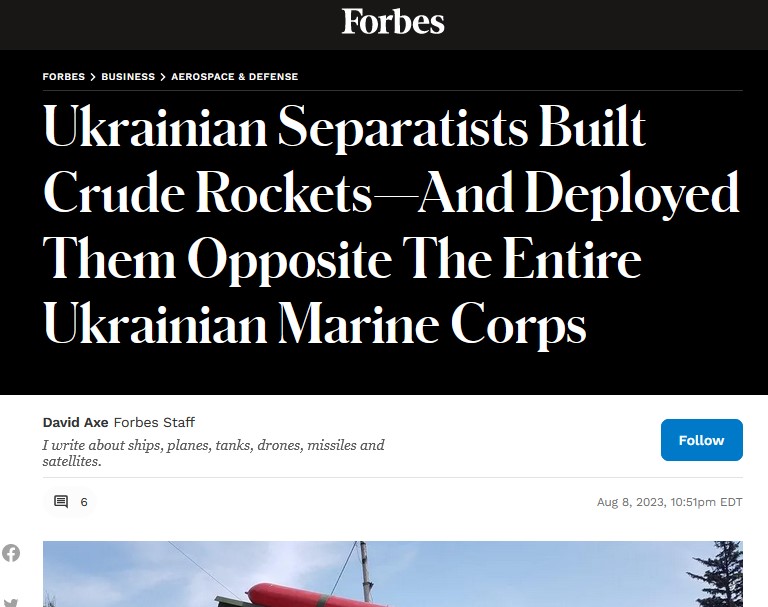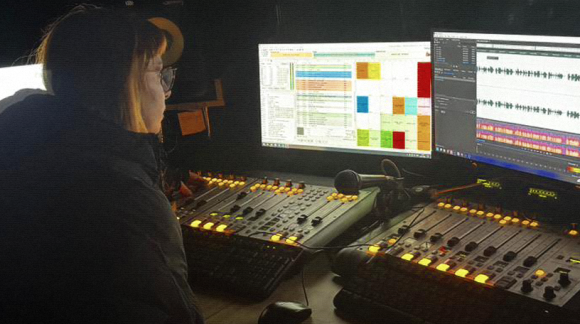The Forbes uses inappropriate terminology when reporting on Russia’s war in Ukraine. Namely, they call the Kremlin-backed pro-Russian rebels “separatists”.
For example, on August 8, the magazine published an online article by journalist David Axe, titled “Ukrainian Separatists Built Crude Rockets—And Deployed Them Opposite The Entire Ukrainian Marine Corps” .

The article reports on the crude rocket launchers “Cheburashka” and “Snezhinka”, which were built by Donetsk collaborators and are now allegedly being employed on the battlefield near Urozhayne, Donetsk oblast.
The author is skeptical of so-called “DNR’s” production capabilities and points out that the Russian reconnaissance group “Cascade”, which is known for having bloggers and Russian politicians in their ranks, is currently fighting in the same spot where the crude rocket launchers are being used. The author believes that the rockets developed in Donetsk are meant for show, not to influence the situation on the front line.
“Five years ago pro-Russian separatists in eastern Ukraine’s Donetsk Oblast crafted a pair of crude rocket-launchers and, with great fanfare, showed them off at a weapons exposition in Donetsk city.
“Now at least one of the do-it-yourself launchers is in action, reportedly in the vicinity of Urozhaine in southern Donetsk Oblast. It probably is no coincidence there’s a unit from the separatist Donetsk People’s Republic on the battlefield near Urozhaine: the weirdo reconnaissance group “Cascade.”
“The Russians and their separatist allies can’t afford to screw around on the [Urozhaine] axis. Which is why the presence of the Cascade recon unit is so strange. Cascade famously hosts bloggers as well as Russian politicians and their sons, so they can say they’ve been to war,” reads the Forbes article.
It needs be remarked that separatists are persons who advocate for the secession of certain territories. Separatism is not an issue in Ukraine, so use of such terminology is unjustified. In Ukraine, there are accomplices of the Russian occupiers who act on their orders and seek the absorbtion of all or part of Ukraine’s territory into Russia. Same applies to the 2014 – 2022 period.
Using such terminology frames Russia’s war on Ukraine (at least before 02/24/22) as a domestic conflict, which plays into Russian propaganda and undermines the efforts to hold Russia accountable for its crimes.
We would also like to remind you that a part of Donetsk region has been ruled by the Russian occupation administration since 2014.
In addition, the author of the Forbes article uses the term “the DPR” without quotation marks, referring to the illegal armed group “DPR”.
We will remind you that Russia has created unlawul administrative bodies in Ukraine’s occupied territories; those are neither republics nor subjects of the Russian Federation. Legally, only the Donetsk and Luhansk oblasts of Ukraine and the Autonomous Republic of Crimea, which is temporarily occupied by Russia, are real. It is better not to use the acronyms LPR and DPR to refer to territories, but only to use them when it comes to the respective Russian administrative structures.
It is also advisable to put these names in quotation marks to stress that the entities in question are “so-called”, for example, leaders of the so-called “DPR”, militants of the so-called “LPR”.
Previously, the Center for Strategic Communication and Information Security partnered with IMI to develop a dictionary of terms related to the events and phenomena of the Russo–Ukrainian war. The English version of the dictionary can be found here.
In September 2022, IMI reported that multiple well-known foreign media were using incorrect terminology when covering the pseudo-referendums that Russia organized in the temporarily occupied territories of Ukraine. Some international media did not use quotation marks when calling the sham election process a referendum or a vote. These included the Associated Press, AlJazeera and Reuters.
Russia held pseudo-referendums on the annexation of the occupied parts of southern and eastern Ukraine on September 23 to 27.
In July 2022, the AFP called the Russian army “Ukrainian separatists.” The Ministry of Foreign Affairs of Ukraine pointed out to the agency that using such a term to refer to the russian troops that have invaded Ukraine is unacceptable.

